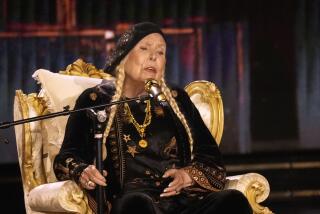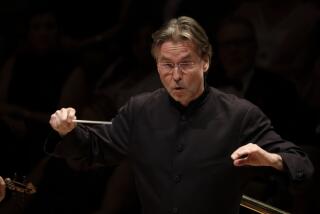How I Made It: Rdio CEO Anthony Bay
The gig: Veteran digital media executive Anthony Bay took over in December as chief executive of Rdio, a streaming music service created by Janis Friis, the co-founder of the Internet phone application Skype (and the file-sharing service Kazaa). Rdio has received favorable reviews, but the 4-year-old Internet jukebox nonetheless has struggled to match the momentum of competing services such as Spotify, which now boasts some 9 million paying subscribers. Rdio has undergone layoffs, a management shake-up and a strategic shift (it now offers a free, advertising-supported version through its website). “The market is poised for growth, and we’re poised to be a big part of it,” Bay said.
Rock star dreams: In sixth grade, Bay dreamed of playing in a rock ‘n’ roll band. He dropped piano lessons and took up the bass guitar (which resembled the Epiphone Casino with the sunburst finish that Beatle Paul McCartney played). “I think by seventh grade I realized it was not going to happen for me,” he said. But that hardly ended his fascination with music.
FOR THE RECORD:
Anthony Bay profile: In the March 2 Business section, a How I Made It profile of Rdio Chief Executive Anthony Bay said that he received his bachelor’s degree in economics from USC. The degree is from UCLA. —
Think different: The purchase of an Apple II sparked an interest in computers, and their power to connect people. That inspired him to start a social network, dubbed Grapevine, decades before the advent of Friendster, Myspace or Facebook. “Timing matters a lot,” he said. “The infrastructure was not ready.” Bay joined Apple Computer in 1986 to run its early online service for dealers, developers and users. Microsoft recruited him in 1994 to help launch the company’s Internet portal, MSN. Eventually, he was promoted to general manager of the company’s digital media division, overseeing the team responsible for the Windows Media Player and other streaming technologies “back when getting something to stream made you really excited,” he said. “People forget that the Internet was not designed to stream.”
Music in the spotlight: In 2000, Bay joined Loudeye as director and chairman. The company operated 90 digital music stores in 20 countries, powering the services of France Telecom, O2 and Nokia. At one point, Loudeye was the second largest music retailer in Europe — behind Apple’s iTunes, and even powered Wal-Mart’s online music store. “All of these companies believed their brands would translate online,” he said. “But I went through the very painful process of realizing that digital media distribution was different.” Nokia acquired Loudeye’s music store business in 2006.
A difficult chapter: Bay was an early investor and served as chairman of a Seattle start-up, MOD Systems, that came up with a novel approach for distributing music through retail kiosks. It raised $35 million in investments from Toshiba and NCR, and tested installations in Starbucks, Circuit City and Best Buy outlets and in airports. But the company became embroiled in scandal when its founder was sentenced to four years in prison for fraud and money laundering. Bay said he was a key witness for the prosecution. “It was one of those nightmare white-collar experiences,” Bay said. “[Founder Mark Phillips] went to jail for different types of fraud, and I basically had to rebuild the company.” Ultimately, MOD was liquidated. “The culture was hard to fix,” he said. “When you take over from a guy like that, the reputational damage ... is really hard to overcome.” Bay joined a more established company, online retail giant Amazon.com, to run its digital video business.
Musical reprise: Rdio presented an opportunity to return to the world of music — though Bay’s experience with MOD made for an 8-month-long courtship, as he sought to vet the company and its backing. The company has struggled to compete with newcomers, such as Beats Music, as well as established players including Internet radio service Pandora. “Rdio is the best-kept secret, in a lot of ways,” he said. “But the core pieces of it are really strong.” Bay said Rdio made a misstep in offering a subscription-only option that didn’t give users the opportunity to sample the service. That changed in January, when Rdio launched a free, ad-supported Web version. Bay said opportunities abound for streaming services, as smartphones make it possible to reach listeners in the developing world. “For the first time in history, you can have access to every song ever recorded. That’s a remarkable thing,” Bay said. “The ability to pull together and curate and make available to people the world’s music on smartphones ... It’s still Day One.”
Personal: The 58-year-old Bay received his bachelor’s degree in economics in 1978 from USC and a master’s degree in business administration in 1990 from San Jose State. He and his wife, Lillian, have three children: Nicholas, Stephen and Sophia. The former Eagle Scout has a life-long passion for travel and a love of the outdoors. An active preservationist, he serves on the board of Woodland Park Zoo in Seattle and also is a part-owner of a game reserve in South Africa.
Favorite song: AC/DC’s “You Shook Me All Night Long” from the album Back in Black.
First concert: Joe Walsh opening for the 1970s rock band the Doobie Brothers at the Winterland Ballroom in San Francisco. “The whole experience was pretty memorable,” he said.






